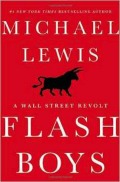(Bloomberg) — Call it the Flash Boys effect.
Michael Lewiss recent book painted a picture of a U.S. stock market where insiders including exchanges, broker-dealers and high-frequency traders are conspiring to cheat investors. His argument may be resonating.
More than two-thirds of financial industry participants, 70 percent, say the U.S. equity markets arent fair for all, according to a survey conducted by ConvergEx Group LLC, which provides brokerage and trading-related services. Just over half, 51 percent, also said high-frequency trading is harmful or very harmful.
Those results suggest agreement with Lewiss view, expressed on Bloomberg Television earlier this month, that the $23 trillion U.S. stock market is rigged. In the same interview, Lewis likened large investors to tourists led to a casino where the card games are fixed.

ConvergExs study had 357 respondents, 233 of whom work at money managers such as mutual funds or hedge funds and 73 at broker-dealers or banks. Conducted from April 16-21, the survey has a margin of error of plus or minus 10 percentage points.
The publication of Lewiss book on March 31 sparked a debate about the fairness of stock trading. The furor came amid investigations by New York Attorney General Eric Schneiderman and the Federal Bureau of Investigation into high-speed strategies and practices. U.S. Securities and Exchange Commission Chairman Mary Jo White said on April 10 that high- frequency trades are an intense focus of the agency. White said the markets arent rigged.
Nasdaq Executive
ConvergEx is overseen by Chief Executive Officer Eric Noll, who until November ran exchange operator Nasdaq OMX Group Inc.s U.S. trading business. In a March 25 call with analysts arranged by Sandler ONeill & Partners LP, Noll defended todays stock market.
There can be real rational changes that can be made to make the market better, Noll said, according to a transcript. But I also think that because it gets complicated, its also subject to much more misinformation by parties who are either trying to make a big story or have a bias.
Despite the negative rhetoric and the worries expressed in their replies, 71 percent of respondents to ConvergExs survey said they havent altered the way they interact with the stock market. Twenty percent said they have slightly changed their behavior, while only 2 percent said they have made significant changes.
Stocks Gain
The Standard & Poors 500 Index, the benchmark measure of U.S. stock prices, has gained 1 percent since the book came out. The index has risen 177 percent since the bear market low in March 2009.
In an interview yesterday with Bloomberg Televisions Trish Regan, TD Ameritrade Holding Corp. Chief Executive Officer Fred Tomczyk said that his brokerages clients are better off now versus previous years.
Theres no question the retail investors getting a better deal today with lower transaction costs, lower spreads and quicker response time than any time in history, he said, adding that the concern raised in Lewiss book is not an issue that the retail investor is particularly engaged in, for the most part.
TD Ameritrade received 70 phone calls and 120 e-mails from its 6 million clients in connection to the book, Tomczyk said. While he said there are aspects of the market the SEC should look at, high-frequency trading in general has been good for the retail investor, he said.



